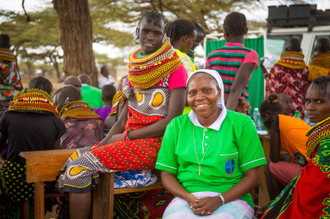Use untapped potential of Catholic Church to recover from Covid says CAFOD report

Sr Jacinta Njeru, from Matercare Hospital, Isiolo with community member. East Africa
Source: CAFOD
The British government should recognise the crucial role played by the Catholic Church in fighting emergencies such as the coronavirus pandemic, says a report out this week.
"The Church has the second largest aid network in the world - Caritas Internationalis," said Graham Gordon, Head of Policy at CAFOD and author of the report. "In many countries, it is the only way of reaching the people who need urgent support. This was clear during the Ebola crisis in West Africa, and we are putting that experience to work in fighting Covid-19."
The report entitled: 'Distinctive role of the Catholic Church in development and humanitarian response', says the vital part played by the Church is too often overlooked by governments and international agencies such as the UN. Instead of being involved at the planning stage, CAFOD and other members of the Church's Caritas aid network are simply asked to carry out plans drawn up elsewhere.
"The Catholic Church is making a distinctive contribution: providing shelter and food for thousands of Rohingya refugees in Bangladesh, peacebuilding and bearing witness to those who are suffering in Colombia and helping to support free and fair elections in DR Congo," said Gordon.
He continued, "its long-term relationships, commitment to communities and acceptance by the local population mean that the Church is often the only institution that stays put when conflict erupts, as in South Sudan. Church leaders will often be at the forefront of defending people's rights and speaking out for peace and justice, such as through the Church's Land Commission in Brazil. But its potential as a development and humanitarian partner remains largely untapped."
As Covid-19 continues to wreak havoc in countries - decimating people's livelihoods, and leaving health systems struggling to provide healthcare and vaccines for the entire population - governments and donors should look to the Church as a partner. The essential Church networks, trusted and rooted in local communities, can reach the most vulnerable people and remote places where governments often struggle to reach. DR Congo is among several countries where the Catholic Church is the main provider of community health services, particularly in more remote areas.
"Colliding with the Coronavirus is a crisis of hunger, ongoing conflict and displacement, climate change and economies on the verge of collapse, threatening years of development gain for communities who have worked to transform their lives, and now find themselves extremely vulnerable and fearful," continued Gordon.
"There is good news, the Church sits on all these frontlines and will remain long after the international community move on, supporting communities to recover, and rebuilding lives and livelihoods."
The report calls on the UK Government - the Foreign, Commonwealth and Development Office (FCDO) - to work more effectively with faith actors in the future to:
- Implement an evidence-based learning programme with faith actors about what has worked in the past, including in the Covid-19-response
- Ensure deeper and ongoing engagement with faith leaders and faith groups at a local and national level through UK Missions
- Develop a strategic approach to working with faith actors, including a faith advisory group
- Provide long-term support for effective partnerships with faith actors, focusing on areas such as peacebuilding and humanitarian response where they are sometimes the only actors who can play an effective role
- The leader of the Catholic Church, Pope Francis, recently warned that, "to trample upon the dignity of another person is in fact to weaken one's own worth". The Church will be raising its voice in the run up to this year's G7 gathering of the richest nations in June and the COP26 climate summit in Glasgow, calling for an agenda where we build back, not just better, but fairer and greener.
"It is time that the part played by the Catholic Church in saving and transforming lives is not only acknowledged, but backed by greater support from donors and government," concluded Gordon.
The report outlines seven clear ways the Catholic Church makes a lasting difference to people's lives.
1. Rapid, local, and inclusive humanitarian response
2. Influencing social norms and behaviour
3. Peacebuilding, mediation, and reconciliation
4. Strengthening democratic governance through citizen participation
5. Speaking truth to power, witnessing and accompanying suffering
6. Providing quality and inclusive healthcare and education
7. Supporting sustainable livelihoods
Download the full report: Distinctive role of the Catholic Church in development and humanitarian response
Read the Executive Summary HERE


















